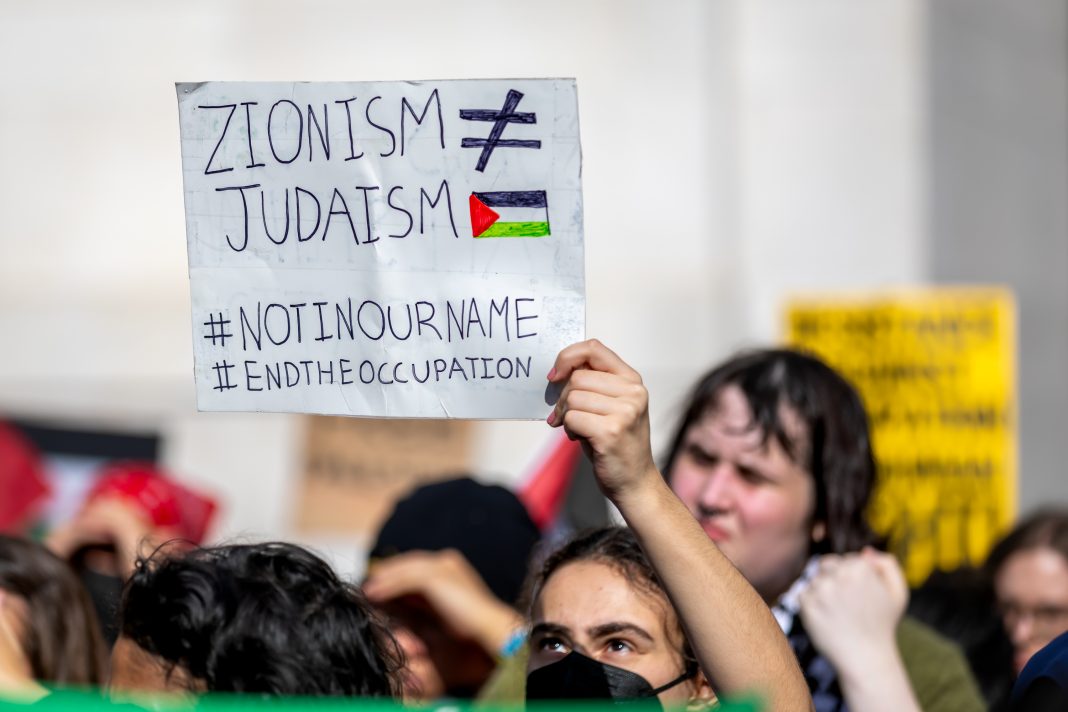As students and faculty return to campuses for the fall semester, the need for protests against institutional complicity with Israel’s actions in Gaza remains urgent. However, university administrations, including New York University (NYU), are not only planning to treat pro-Palestinian speech with intellectual dishonesty but also using their specious logic to suppress dissent.
NYU recently shared an updated code of student conduct that claims to combat bigotry but instead threatens to silence criticism of Zionism on campus. The new language in the code of conduct implies that speaking out against Zionism, an ethno-nationalist political ideology, violates the school’s nondiscrimination policies. This move by NYU sets a troubling example for other universities.
The corporatized nature of American higher education means that social justice and liberatory knowledge production are not prioritized. However, NYU’s actions go beyond that and are particularly concerning. By equating criticism of Zionism with discrimination against Jewish people, the university’s guidelines expand protected classes to include “Zionists” and “Zionism.” This move erases the distinction between anti-Zionism and antisemitism and undermines the long history of Jewish anti-Zionism.
The guidance from NYU takes the flawed premise that “Zionist” is functioning as a code word, assuming that it is inherently antisemitic when used critically. This approach ignores the efforts of anti-Zionists to prevent the conflation of “Zionist” with “Jewish.” It is actually Zionists themselves who insist on this conflation, claiming that Israel represents all Jews. By treating Zionism as a protected category, NYU’s guidelines suppress ethically committed and politically informed anti-Zionism.
The new conduct guide at NYU sets a dangerous precedent by extending Title VI protections to anyone who adheres to Zionism. This move equates criticism of Zionism with discrimination against Jewish people and could legitimize far-right and ethno-nationalist ideologies under the guise of protecting students from racial discrimination.
The conduct guidance also blurs the line between anti-Zionism and antisemitism by listing examples of both in the same document. This obliterates the distinction between reasonable political opposition and discriminatory actions. For instance, rejecting adherents of Zionism from certain group activities is not discriminatory if Zionism is understood as a political ideology rather than a protected category.
NYU’s conduct guide is part of a broader trend of conflating anti-Zionism with antisemitism on college campuses. This conflation is often based on the International Holocaust Remembrance Alliance’s definition of antisemitism, which has been criticized for conflating anti-Zionism with antisemitism. However, NYU’s guidelines go even further than the IHRA by specifically protecting Zionism as a category.
The timing of NYU’s conduct guide is not coincidental. It comes after federal litigation brought against the university by pro-Israel Jewish students who claimed they felt unsafe on campus. The university reached a settlement with the students, agreeing to pay them an undisclosed sum of money and create a new administrative position to oversee compliance with Title VI. This litigation is part of a broader effort to silence anti-Israel speech and expression on college campuses.
Instead of addressing the demands of student-led protests for institutional divestment, universities are doubling down on anti-protest regulations and baseless claims that Palestinian solidarity makes Jewish students unsafe. This approach perpetuates false conflations and myths that Palestinian freedom is a threat to Jewish safety. Universities should be committed to demystification and challenging these harmful narratives.
In conclusion, the actions of university administrations like NYU’s are concerning and undermine the ability of students and faculty to speak out against Israel’s actions in Gaza. By equating criticism of Zionism with discrimination against Jewish people, universities are suppressing legitimate dissent and erasing the long history of Jewish anti-Zionism. It is crucial for universities to prioritize freedom of speech and support the Palestinian cause for liberation.


